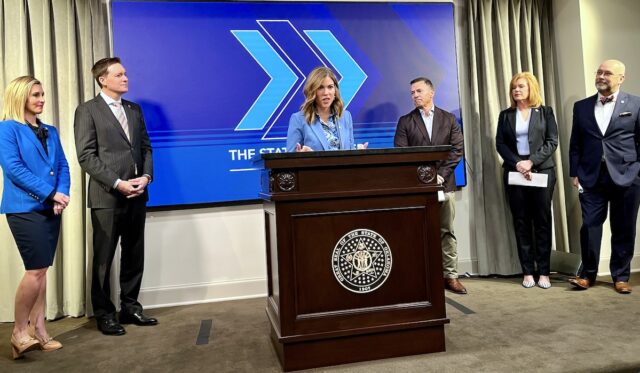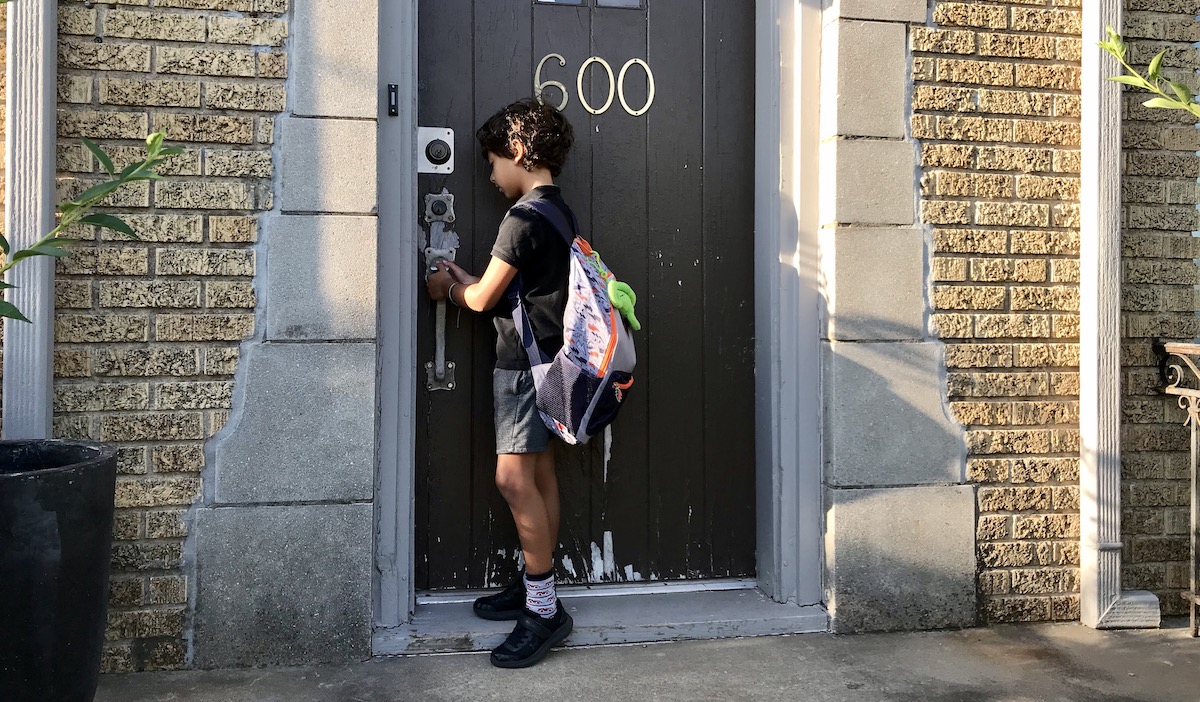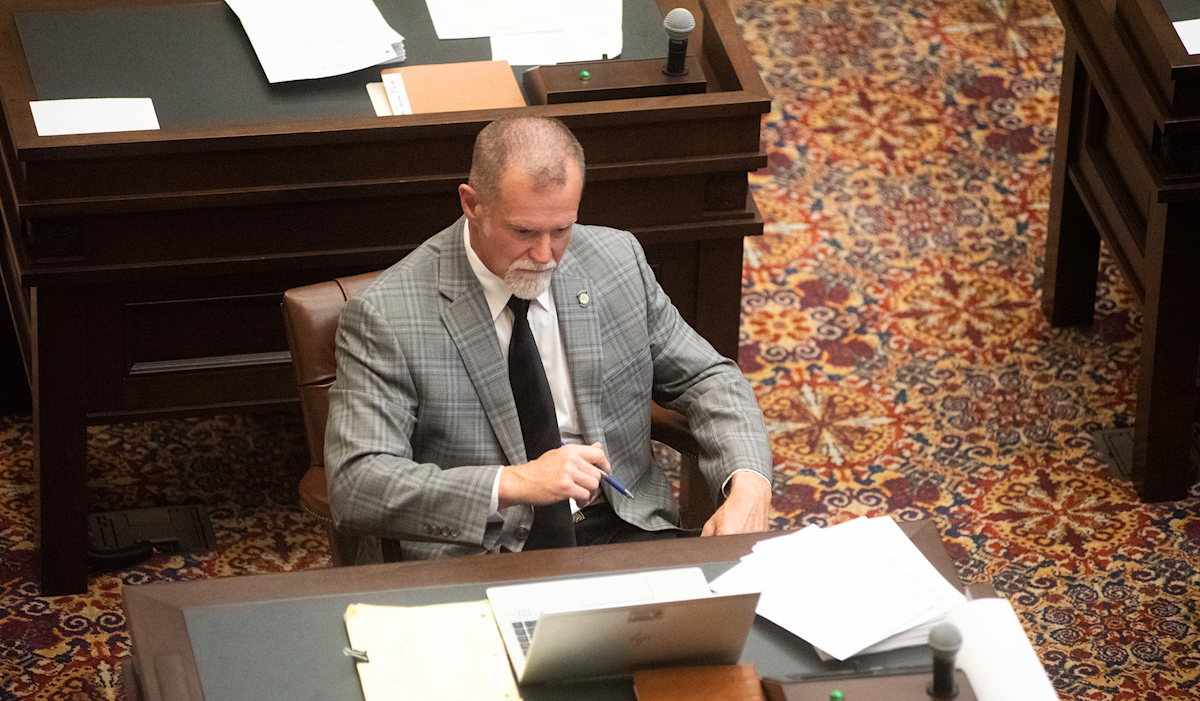
When House Speaker Charles McCall announced Rep. Kyle Hilbert as speaker-designee for the 2025 legislative session, he praised the 29-year-old’s experience.
But when Hilbert (R-Bristow) stepped to the podium, he noted his relative youth and told a story about how he and his wife had to scramble when their daughter’s child childcare center announced it was closing with less than a week’s notice to make new arrangements.
“I think (there is benefit) having a speaker of the House who has a young family and knows what it’s like [when] mom and dad are working but you also have kids and the challenges of trying to find daycare or daycare closes for a day or childcare closes. What does that look like?” Hilbert asked. “[My wife] was pregnant at the time — had another kid on the way, and those are real challenges that Oklahoma families face.”
The numbers support Hilbert’s assessment. In 2023, Oklahoma ranked 46th in overall child wellbeing, according to the Annie E. Casey Foundation Kids Count Data Book national report. The report specifically examined “how the country’s lack of affordable and accessible child care negatively affects children, families and U.S. businesses.”
Experts in Oklahoma, such as former state senator and current executive director of the Potts Family Foundation AJ Griffin, have a similar assessment.
“First of all, this is a nationwide issue,” Griffin said Feb. 14. “The shortage of childcare has been growing as an issue over the last couple of decades, and the pandemic definitely exacerbated the problem.”
Data from the Center For American Progress indicate that 55 percent of Oklahomans live in a childcare desert, defined as “any census tract with more than 50 children under age 5 that contains either no childcare providers or so few options that there are more than three times as many children as licensed childcare slots.”
The number is slightly higher than the 51 percent of all U.S. residents living in a childcare desert.
As Oklahomans deal with the shortage of childcare centers, early childhood experts emphasize the importance of trained providers in the sector, saying that how a child is raised in its first few years can affect them for the rest of their life.
“If we look at the gaps we have in achievement around reading among Oklahoma school kids, that gap is actually created before they ever arrive in school in communities that are under resourced,” Griffin said in a separate interview Oct. 10. “There’s a very clear link in the literature between what happens in the first five years of life — and even before they’re born — and how well they perform once they get to school.”
Some childcare bills advance: ‘It is a workforce issue’

While Hilbert avoided the weeds of childcare policy in his March 4 remarks, other legislators have attempted to dig in this legislative session.
Legislators have proposed a few bills dealing with childcare, and one measure has already stalled after failing to receive a committee hearing. Four others face the legislative deadline for bills to advance from their chamber of origin Thursday.
Although some of the bills have drawn praise from childcare access advocates, another has sparked sharp criticism. Bills seeking to address childcare access that have advanced out of committees are:
- HB 4147 by Rep. Suzanne Schreiber (D-Tulsa), which would create through 2029 a new corporate income tax deduction for employers that help their employees access childcare and would create a $1,000 refundable personal income tax credit for qualified childcare workers;
- HB 1808 by Schreiber, which would allow childcare workers to claim federal childcare subsidies regardless of household income;
- HB 3530 by Rep. Trish Ranson (D-Stillwater), which would align Oklahoma’s implementation of federal child care subsidies with new guidelines; and
- SB 1239 by Sen. Warren Hamilton (R-McCurtain), which would exempt “family child care homes” that operate 30 or fewer hours per week from state licensing requirements.
Schreiber’s HB 4147, which proposes capping the total employer tax credits at $5 million per year and the total childcare worker tax credits at $14 million per year, advanced from the House floor on an 86-8 vote Tuesday morning. It has been identified as a priority measure for the State Chamber of Oklahoma, the Greater Oklahoma City Chamber of Commerce and the Tulsa Regional Chamber of Commerce.
“Oklahoma has lost 1,000 day cares in the last 10 years,” State Chamber President and CEO Chad Warmington said at a January press conference. “We have to be purposeful and thoughtful about addressing the shortage of childcare around the state of Oklahoma if we want to have the workforce we say we want to support the economy we are going to try to recruit.”
Schreiber spoke at the same press conference about the “very complicated” policy topic.
“The childcare industry has to be strong for our economy to be strong,” she said. “Oklahoma has about a 62 percent labor force participation, and that’s behind the national average. We have a lot of people who are not participating, and we have a lot of parents who are not participating, which tells us what? These parents want to work, but they cannot find childcare or they can’t afford it.”
Schreiber said HB 4147, which had its title struck in the House owing to its fiscal impact, supports childcare workers who often earn less than $15 per hour and sometimes lack access to health care and other benefits.
Similarly, she said the bill offers employers a tax credit covering up to 30 percent of paid childcare expenses for a maximum benefit of $30,000 per employer. The employer credit can be carried forward for a maximum of five years.
“This tax credit is a very direct way of supporting our employers and our employees who want to get back into the workforce,” she said.
Senate Education Committee Chairman Adam Pugh (R-Edmond) has signed onto HB 4147 as its Senate author, but a separate bill he filed to create a tax credit for businesses that launch their own onsite childcare facilities failed to receive a hearing in the Senate Finance Committee.
Calling Oklahoma a childcare desert, Pugh said he thought his proposal touched on numerous important issues.
“This was an issue for me because I’ve got three little kids,” Pugh said Feb. 7. “It was borne out of my own experiences, for certain. I think it is a workforce issue. I think it is a pro-life issue. I think it is a pro-family issue. (…) I think it’s an education issue.”
Although it was assigned to the Senate Finance Committee, Pugh’s proposal never received a vote, and he did not respond to a request for comment after the committee deadline.
Hamilton bill would deregulate some family childcare homes

As Schreiber’s bill awaits floor consideration, three other consequential childcare bills each advanced out of their respective committees and now await floor votes, including one more from Schreiber that she said complements HB 4147. Ranson’s bill adjusting rules for the federal child care subsidy has received praise from childcare advocates, but Hamilton’s bill has received some criticism.
Griffin said Hamilton’s bill represents one of the “typical” ways to address the childcare shortage through deregulation, but she also called it “extreme.”
“The version that passed in committee (…) jeopardizes the safety of children,” Griffin said.
But Hamilton expressed the opposite sentiment during Senate Health and Human Services Committee hearing for his bill.
“I do not in any way believe that this will jeopardize the safety of Oklahoma’s children,” Hamilton said.
Hamilton argued his bill is an attempt to address childcare shortages and that “family childcare homes” are defined in state statute as childcare centers that operate out of someone’s home with seven or fewer children. His proposal would exempt them from existing childcare licensing requirements.
“It’s an attempt to alleviate the childcare deserts that exist predominantly in rural Oklahoma,” Hamilton said. “The intent of this is to allow people who are really not doing this as a business — they’re simply trying to help out their neighbors — to provide care for children that belong to parents who are having a hard time finding a place for their kids to receive childcare.”
In her debate for the bill, Sen. Julie Daniels (R-Bartlesville) said too much regulation is contributing to the childcare shortage and suggested that training courses on the Internet could take the place of licensing requirements that currently aim to ensure kids in childcare facilities stay safe and healthy.
“This is the problem where the burden of regulation has now tilted the balance so that we actually do not have enough childcare facilities,” Daniels said. “I absolutely understand the need for training. I would also submit that if I were going to take care of children in my home, there is something called the Internet, and I could learn a lot in how to have safe practices even outside of a licensing regimen if I am seriously going to take care children more than occasionally in my home.”
During the committee hearing, Sen. Carri Hicks (D-OKC) debated against the bill. She also criticized Hamilton’s bill in a press release sent after it advanced.
“Removing oversight leaves infants at risk due to a lack of sleep training. I’m particularly concerned about eliminating background checks which screen out convicted child-abusers,” Hicks said in the press release. “We have a critical shortage of child care in our state, but safety regulations are not the issue — it’s the high cost, and that’s something we need to address.”
‘A suite of incentives’

Ranson’s childcare subsidy bill also recently advanced out of committee with little fanfare or discussion.
During the committee hearing, Ranson said her proposal simply directs the Department of Human Services to align with new requirements for the federal Child Care and Development Block Grant.
“That would have a positive impact on availability (of childcare),” Griffin said of Ranson’s bill.
The CCDBG is a federal grant provided to states to subsidize childcare for low-income families. According to Ranson, the new requirements cap family copayments for childcare at 7 percent of their household income and set the minimum subsidy rate at 75 percent.
HB 3530 advanced out of the House Appropriations and Budget Committee on Feb. 28 with only one vote against it and no discussion.
Schrieber’s HB 1808 is also related to the federal childcare subsidy. The proposal would remove household income considerations when determining program eligibility for employees of licensed childcare centers, functionally allowing childcare workers to have the subsidized service regardless of income.
“Many of those people, we already paid for their childcare. They qualify for that subsidy,” Schreiber said of HB 1808. “So really, we’re already offering that. This just allows the businesses to actually offer this categorically without any reservations. It’s almost a business benefit that they can say to individuals, ‘If you come and work in the childcare industry, or if you stay and work in the childcare industry, your childcare is paid for.'”
Schreiber said she feels both of her bills are important to address the problem.
“They’re complementing each other in the way that they’re incentivizing the workforce,” Schreiber said. “People think about [the childcare crisis as] we don’t have enough actual buildings. That’s not the way to think about it. We don’t have enough actual people taking care of kids because in this highly regulated industry.”
Schrieber said HB 4147 is her priority legislation, but she said HB 1808 is also important.
“Every single time we incentivize a childcare worker with either a tax credit or free childcare or both, we’re creating huge capacity numbers,” Schreiber said. “We’re just growing our numbers so fast. So it’s important to think about these as a suite of incentives.”
(Update: This article was updated at 5:20 p.m. Tuesday, March 12, to reflect that HB 4147 advanced from the House floor earlier in the day.)





















